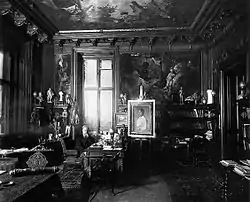Nikolaus Dumba
Nikolaus Dumba (Greek: Νικόλαος Δούμπας; 24 July 1830, Vienna – 23 March 1900, Budapest) was an Austrian industrialist and liberal politician. He is considered to have been an important patron of the arts and music and a benefactor of Greece.[1]

Heinrich von Angeli
Biography
In 1817, Nikolaus' father Stergios, an immigrant to Vienna from a family of Aromanian[2][3] or Greek[4][5] descent from Vlasti, a village then part of the Ottoman Empire and today in Greece, became a merchant. Nikolaus attended the Akademisches Gymnasium and spent the revolutionary years of 1847-48 with his brother Michael at the residence of the Austrian Ambassador Anton von Prokesch-Osten in Athens. In 1852, he took a trip to Egypt with the travel writer Alexander Ziegler.
He was trained for a commercial career and took over a cotton mill in Tattendorf that had been operated by his cousin Theodore. It had approximately 180 employees and soon became a highly profitable enterprise. This financial base allowed him to turn his interests elsewhere. He was knighted and appointed to the legislature, where he was very active.
His son, Konstantin, was Austria-Hungary's last Ambassador to the United States.
Patron of the arts and benefactor
In Vienna

He was a close friend of Hans Makart, Gustav Klimt and Carl Kundmann and was a strong promoter of contemporary art. He helped establish several monuments to famous composers of the past and served as a Vice-President of the Friends of Music Society.
Dumba left 50,000 florins to the Men's Choral Society of Vienna in order to free them from financial concerns. In return, he asked that "from time to time, a choral work in remembrance of me should be performed in a church" and that "the money should never be used for a building". To this day, Franz Schubert's German Mass is often sung in his honor.[6]
Dumba was a major donor for the Musikverein building. The Austrian government named a small street (Dumbastraße) near the Musikverein after him.
In his will, he bequeathed over 200 original manuscripts by Schubert to the City of Vienna. These formed the basis for what is now the world's largest collection of musical scores at the Vienna City Hall Library.
In Greece
During a visit to Athens with his wife Anna, he made a grant to the University of Athens to finish the building interiors. In the city of Serres, near his father's hometown, he founded an orphanage and contributed to the construction of a vocational school, under the aegis of his friend and fellow Aromanian, Georgios Averoff.[7]
Political functions
From 1870 to 1896, he was a member of the Landtag, where he served on the Finance Committee and the Poor Law Committee, occasionally acting as the Landtag chairman's deputy. In 1885, the Kaiser appointed him to the Herrenhaus, the Upper Chamber of the Imperial Council of Austria.
Selected honors
Medals
- Austrian Empire and Austria-Hungary
- Order of the Iron Crown, Second Class
- Knight's Cross of the Order of Franz Joseph
- Romania
- Commander's Cross, First Class, of the Romanian Order of the Crown
Places
- On 28, March, 1900, the "Künstlergasse" (Artist Lane) was renamed "Dumbastraße" (Dumba Street), by vote of the Vienna City Council.
References
- John Tzafettas, Elvira Konecny. Nikolaus Dumba (1830-1900): A dazzling figure in imperial Vienna. ISBN 978-1910714201
- Ransmayr, Anna (2017). Greek Presence in Habsburg Vienna: Heyday and Decline. "...Nikolaus Dumba, himself descendant of an Aromanian family who had ties to both Romania and Greece".
- Motta, Giuseppe (2011). "The Fight for Balkan Latinity. The Aromanians until World War I" (PDF). Mediterranean Journal of Social Sciences. 2 (3): 252–260. doi:10.5901/mjss.2011.v2n3p252. ISSN 2039-2117.
- John Tzafettas, Elvira Konecny. Nikolaus Dumba (1830-1900): A dazzling figure in imperial Vienna. ISBN 978-1910714201
- "Dumba Nikolaus". In: Österreichisches Biographisches Lexikon 1815–1950 (ÖBL). Vol. 1, Austrian Academy of Sciences, Vienna 1957, p. 203.
- Wiener Männergesang-Verein: 150 Jahre Wiener Männergesang-Verein 1843–1993. Festschrift, Wien 1993
- City of Serres website Archived 2017-10-08 at the Wayback Machine(in Greek)
Further reading
- "Dumba Nikolaus". In: Österreichisches Biographisches Lexikon 1815–1950 (ÖBL). Vol. 1, Austrian Academy of Sciences, Vienna 1957, p. 203.
- Felix Czeike: Historisches Lexikon Wien. Verlag Kremayr & Scheriau, Wien 1993, ISBN 3-218-00544-2 (volume 2) p. 107.
- Elvira Konecny: Die Familie Dumba und ihre Bedeutung für Wien und Österreich, ISBN 3-85369-650-3.
- Nina Riedl-Riedenstein (1959), "Dumba, Nicolaus", Neue Deutsche Biographie (in German), vol. 4, Berlin: Duncker & Humblot, pp. 188–189; (full text online)
- Herwig Würtz: Nicolaus Dumba, Portrait eines Mäzens. Die Schubert-Sammlung der Stadt Wien.
External links
- TAR (Music Magazine): biography of Dumba(in Greek)
- † Nikolaus Dumba. In: Neue Freie Presse, Evening paper, 23 March 1900, p. 3 (Online at ANNO) (First news of his death)
- † Nikolaus Dumba. In: Neue Freie Presse, 24 March 1900, p. 4 (Online at ANNO) (Detailed report and obituary) Fortsetzung S. 5
- Todesanzeige. In: Neue Freie Presse, 25 March 1900, p. 21 (Online at ANNO)